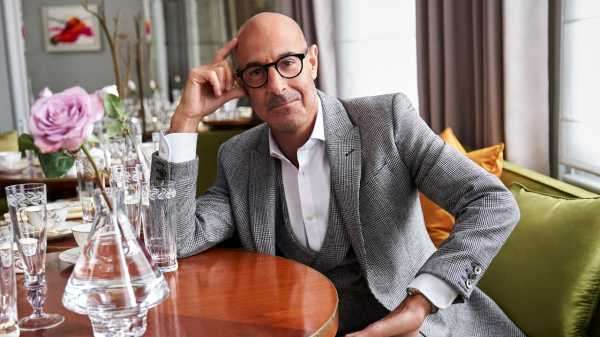
Stanley Tucci has been in front of the camera, in one form or another, for some four decades now. He’s always had that certain movie-star élan, always been a master of the charismatic smolder. But it was not until April of last year, at the age of fifty-nine, that he became a proper sex symbol of the digital age. It was a few weeks into the first wave of the coronavirus pandemic, and Tucci’s wife, the literary agent Felicity Blunt, filmed a short phone clip in their London home of her husband mixing her a Negroni, the classic Italian cocktail, as he narrated his process step by step. The video is three minutes and seventeen seconds of obscene domestic fantasy: a man stands at a built-in bar stocked with top-shelf liquor and elegant glassware; he banters flirtatiously with his wife; his hands move with the fluidity of a confidence man dealing an ace from the bottom of the deck. Tucci is trim, gently muscled, bespectacled, a little arch, a little icy. In the background, a tidy children’s playroom is just visible, evidence of life beyond the cocktail. The video, posted to Instagram, became a viral sensation.
As Tucci explains in his new memoir, “Taste: My Life Through Food,” his career has orbited the world of food and drink nearly from the start. The book is a decidedly un-Hollywood memoir that traces Tucci’s path from son (and grandson) of magnificently talented Italian American home cooks up through his most recent project, the CNN series “Stanley Tucci: Searching for Italy,” in which he takes on the role of culinary tour guide. He writes that the realization that food, and not acting, is the central passion of his life came in 2017, after he was diagnosed with a form of oral cancer, the treatment for which destroyed his taste buds and left him temporarily reliant on a feeding tube. “Food not only feeds me, it enriches me,” he writes. “All of me. Mind, body, and soul.” Tucci and I spoke recently via video chat, as part of The New Yorker Festival. Our conversation, which has been edited for length and clarity, touches on the process of writing a memoir, the importance of truth in art, and why terrible meals aren’t always bad.
Sourse: newyorker.com






